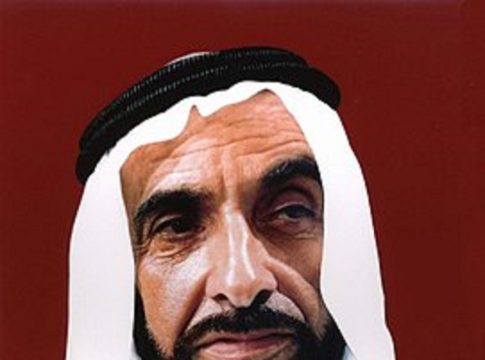Born in 1918 in Abu Dhabi, Sheikh Zayed was the youngest of the four sons of His Highness Sheikh Sultan bin Zayed Al Nahyan, Ruler of Abu Dhabi from 1922 to 1926. At the time of Sheikh Zayed’s birth, the economy was based primarily on fishing and pearl diving and on simple agriculture in scattered oases inland.
As Sheikh Zayed grew into a young man, he travelled extensively throughout the country, gaining a deep understanding of the land and its people. In the early 1930s, when oil company teams arrived to undertake preliminary geological surveys, he obtained his first exposure to the industry that would shape the development of the UAE today.
Through the late 1920s and 1930s, Sheikh Zayed’s thirst for knowledge took him into the desert, living alongside Bedouin tribesmen to learn all he could about their way of life and connection with their surroundings. He joyfully recalled his experiences of life and his initiation into the sport of falconry, which became a lifelong passion.
In 1946, Sheikh Zayed was chosen as Ruler’s Representative in Abu Dhabi’s Eastern Region, centred on Al Ain, 160 kilometres inland east of Abu Dhabi. He brought to his new task a firm belief in the values of consultation and consensus and his judgments ‘were distinguished by their acute insights, wisdom and fairness.’ The job involved ruling over six villages and an adjacent desert region.
In August 1966, Sheikh Zayed became Ruler of Abu Dhabi, with a mandate to develop the Emirate as quickly as possible. His years in Al Ain had given him valuable experience in government and time to develop a vision of progress. With the export of the first cargo of Abu Dhabi crude oil in 1962, Sheikh Zayed could rely on oil revenues to start an infrastructure overhaul, constructing schools, housing, hospitals and roads.
In 1968, with the British announcement of the country’s withdrawal from the Arabian Gulf, Sheikh Zayed stepped to action to quickly establish closer ties between the Emirates. Together with the late Ruler of Dubai, Sheikh Rashid bin Saeed Al Maktoum, Sheikh Zayed called for a Federation that would include not only the seven Emirates that made up the Trucial States, but also Qatar and Bahrain. Eventually, seven states followed Sheikh Zayed in establishing the UAE, which formally emerged on the international stage on 2 December 1971.
One foundation of his philosophy as a leader and statesman was that the resources of the country should be fully used to the benefit of the people. This extended to the women of the UAE, who flourished under his visions of education, employment and equality for all Emiratis. In governing the nation, Sheikh Zayed drew from Arabian Bedouin traditions of consensus and consultation. At an informal level, that principle has long been practised through the institution of the Majalis (council), where a leading member of society holds an “open-house” discussion forum. The forum allows any individual the opportunity to proffer views for discussion and consideration.
In 1970, recognizing that Abu Dhabi was embarking on a process of rapid development, Sheikh Zayed formalised the consultation process and established the National Consultative Council, bringing together the leaders of each of the main tribes. A similar body was created in 1971 for the entire UAE – the Federal National Council, the state’s parliament. As the country grew, the conservation of the natural environment and wildlife was critical to Sheikh Zayed.
He believed that the character of the Emirati people derives, in part, from the struggle to survive in the harsh and arid local environment. In this vein, Sheikh Zayed worked throughout his life to ensure the preservation of species such as the Arabian Oryx and the sand gazelle. The World Wildlife Fund recognized his great contribution with the prestigious Gold Panda award.
Sheikh Zayed passed away in 2004, in his late eighties, leaving behind an inspiring legacy as the father of the nation. He was succeeded as the UAE’s President and as Ruler of Abu Dhabi by his eldest son, His Highness Sheikh Khalifa bin Zayed Al Nahyan, in 2004. The principles and philosophy that he brought to government, however, remain at the core of the state, and of its policies, today.


